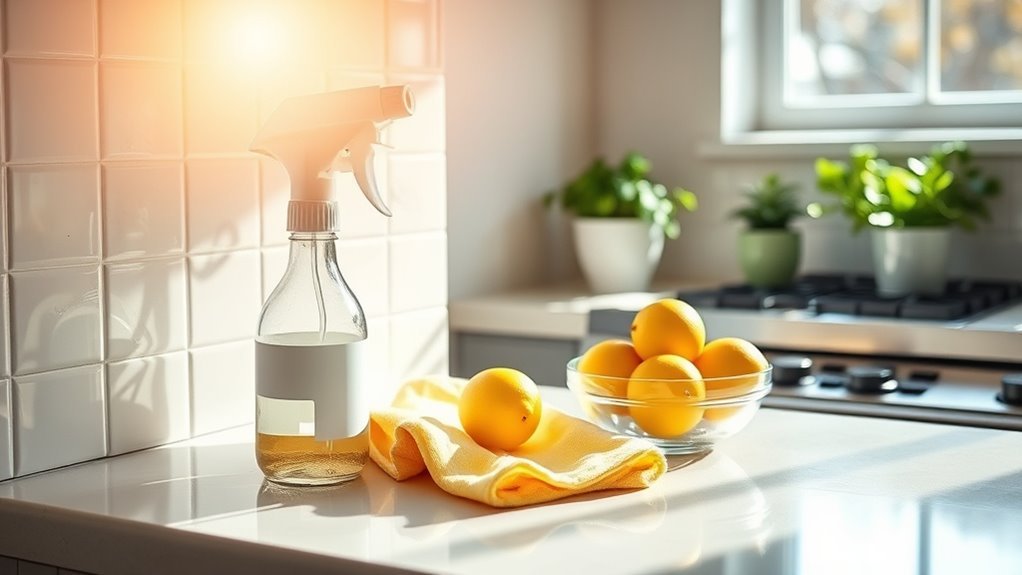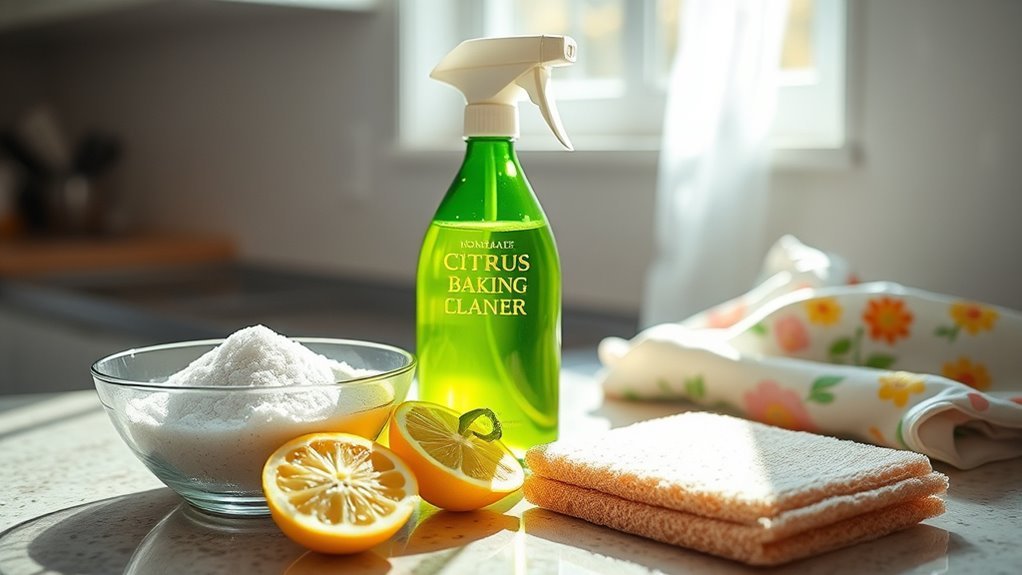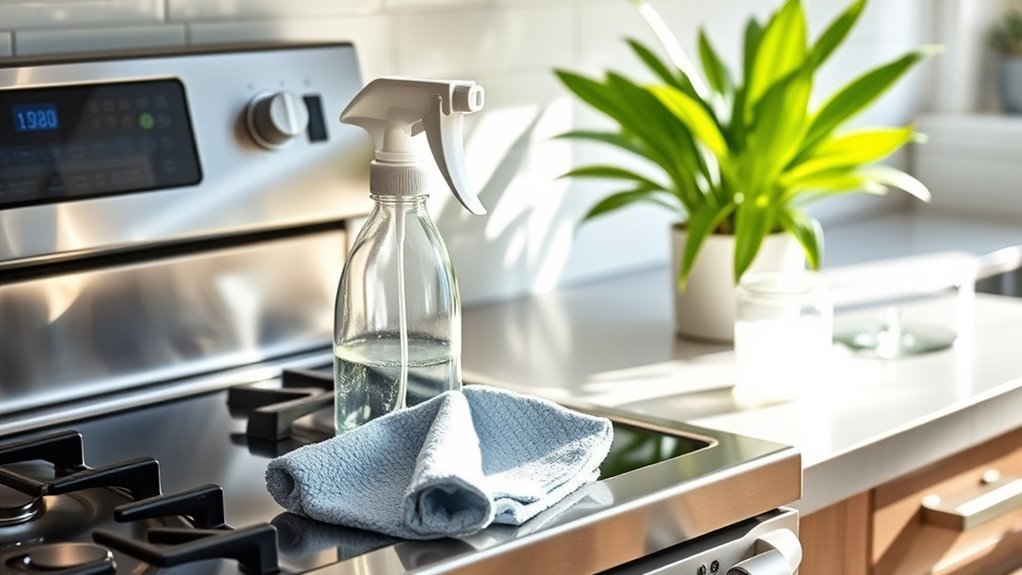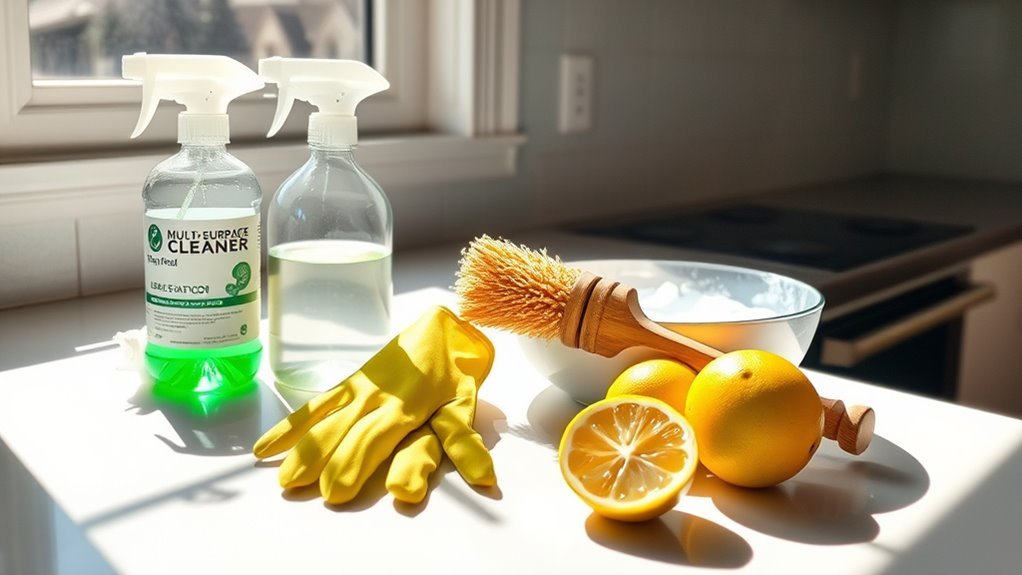Spring Cleaning Guide for Grease
When spring cleaning grease, start by gathering eco-friendly cleaners, degreasers, baking soda, vinegar, and scrubbing tools. Unplug appliances, soak removable parts, then apply your natural mixtures to break down grease. Wipe surfaces immediately after cooking and regularly clean exhaust fans to avoid buildup. Dispose of grease properly in sealed containers, never down the sink. Keeping your kitchen tidy and ventilated reduces hazards and simplifies future cleanings. With these basics, you’ll be set to explore deeper tips and tricks for a spotless, grease-free kitchen.
Understanding Grease and Its Impact on Your Home

Although grease might seem harmless at first, it can cause serious problems in your home if left unchecked. You should know that grease composition typically includes fats, oils, and other sticky substances that easily cling to surfaces. Grease sources are often found in your kitchen—think cooking oils, food residues, and even residues from fried foods. Over time, this buildup can block drains, damage appliances, and create unpleasant odors, limiting your freedom to enjoy a clean, efficient space. Understanding where grease comes from and what it’s made of empowers you to tackle it head-on. By staying aware of grease composition and sources, you can maintain your home’s cleanliness and prevent stubborn problems from taking hold, giving you the freedom to live comfortably without grease-related worries.
Essential Tools and Supplies for Grease Removal
To tackle grease effectively, you’ll need the right cleaning agents like degreasers and heavy-duty detergents. Don’t forget essential tools such as scrub brushes, microfiber cloths, and sponges to help break down and remove buildup. Having these supplies on hand makes grease removal much more manageable and efficient.
Must-Have Cleaning Agents
Five essential cleaning agents can make grease removal much easier and more effective. First, eco friendly cleaners let you tackle grime without compromising your values or the environment. They’re gentle yet powerful enough for light to moderate grease. For tougher messes, heavy duty degreasers break down stubborn buildup fast, giving you the freedom to clean deeply without endless scrubbing. Additionally, you’ll want a good all-purpose cleaner for routine maintenance and a baking soda paste for natural abrasion. Finally, white vinegar is a versatile agent that cuts through grease and leaves surfaces fresh. With these agents on hand, you’re set to reclaim your space from grease, combining effectiveness with your desire for a cleaner, freer lifestyle.
Effective Tools for Degreasing
Having the right cleaning agents is only part of the equation when tackling grease. You also need effective tools to make your job easier and more efficient. For DIY degreasing techniques, grab a sturdy scrub brush, microfiber cloths, and a spray bottle to apply your homemade solutions evenly. Rubber gloves will protect your skin, giving you the freedom to scrub without worry. If you prefer commercial degreaser options, choose a heavy-duty sponge or a non-abrasive pad designed for tough grease. A plastic scraper can help lift stubborn buildup without damaging surfaces. By equipping yourself with these essential tools, you’ll cut through grease faster, leaving your space spotless and freeing you up to enjoy the results of your hard work.
Effective Natural Solutions for Tackling Grease

You can tackle grease naturally using a few powerful ingredients you probably already have. Vinegar cuts through grease effortlessly, while baking soda works as a gentle abrasive to scrub away stubborn spots. Adding citrus oils not only boosts cleaning power but leaves a fresh scent behind.
Vinegar’s Grease-Fighting Power
One of the simplest and most effective ways to cut through grease is with vinegar. Its natural acidity breaks down greasy residues, making vinegar a powerful ally in your spring cleaning arsenal. When you use vinegar, you’re tapping into a chemical property that dissolves oils without harsh chemicals, giving you a safer, eco-friendly option. The vinegar benefits extend beyond grease removal—it also deodorizes and disinfects, helping you reclaim a fresher, cleaner space. Just mix equal parts water and vinegar in a spray bottle, apply to greasy surfaces, and wipe away grime effortlessly. By choosing vinegar, you’re not only tackling stubborn grease but also embracing freedom from toxic cleaners, empowering you to clean with confidence and care for your environment.
Baking Soda Scrub Benefits
Though vinegar works wonders, baking soda offers a different kind of grease-fighting power that’s just as natural and effective. When you use baking soda, you tap into unique baking benefits that make scrubbing away grease easier and safer for your surfaces. Its gentle abrasiveness lifts grime without harsh chemicals, giving you freedom from toxic cleaners.
Try these scrub techniques to maximize baking soda’s power:
- Sprinkle baking soda on greasy spots.
- Add a few drops of water to form a paste.
- Use a soft cloth or sponge to scrub gently.
- Rinse with warm water to remove residue.
- Repeat as needed for stubborn grease.
With baking soda, you take control, cleaning thoroughly while keeping your space fresh and chemical-free.
Citrus Oils for Cleaning
Baking soda’s gentle abrasiveness is great for scrubbing, but sometimes grease calls for a more powerful punch. That’s where citrus oils for cleaning come in. Their natural citrus benefits break down stubborn grease effortlessly, while essential oils offer a fresh, uplifting scent that frees your space from chemical odors. You’ll love how these oils cut through grime without harsh residues, giving you freedom to clean naturally.
| Citrus Oil | Key Benefit | Best Uses |
|---|---|---|
| Lemon | Degreasing power | Kitchen surfaces, stovetops |
| Orange | Antibacterial | Cutting boards, utensils |
| Grapefruit | Deodorizing | Garbage disposals, sinks |
Using citrus oils lets you tackle grease effectively while embracing a natural, liberated cleaning routine.
Step-by-Step Cleaning Techniques for Kitchen Appliances

When tackling grease buildup on your kitchen appliances, starting with a clear plan will make the process much easier. Deep cleaning not only restores your appliances’ shine but also extends their life, supporting effective appliance maintenance. Here’s a straightforward approach to free your kitchen from stubborn grease:
- Unplug appliances and remove detachable parts.
- Soak removable pieces in warm, soapy water.
- Use a degreaser or a mixture of vinegar and baking soda on grease spots.
- Gently scrub with a soft brush or cloth to avoid scratches.
- Wipe down all surfaces with a damp cloth and dry thoroughly.
Following these steps lets you reclaim your space without hassle, ensuring your appliances stay in peak condition and you remain in control of your kitchen environment.
Tips for Maintaining a Grease-Free Cooking Environment
Keeping your kitchen appliances clean is a great start, but maintaining a grease-free cooking environment takes ongoing effort. You’ll want to adopt grease prevention strategies like wiping surfaces immediately after cooking and using splash guards to minimize grease spread. Organizing your kitchen efficiently also plays a key role—implement kitchen organization tips such as storing frequently used items within reach to avoid unnecessary mess and keeping countertops clutter-free to simplify cleaning. Regularly cleaning exhaust fans and filters prevents grease buildup in hidden spots. By staying consistent with these simple habits, you’ll enjoy a freer, cleaner cooking space that supports your desire for ease and independence in the kitchen, making spring cleaning less of a chore and more of a breeze.
Preventive Measures to Minimize Grease Buildup
Grease buildup can quickly turn a clean kitchen into a greasy mess if you don’t take preventive steps. To keep your space fresh and free, focus on proactive habits that give you freedom from constant scrubbing. Start by installing effective grease traps to catch oils before they clog drains. Combine this with regular maintenance to avoid stubborn blockages. Here’s what you can do:
- Clean grease traps frequently to maintain efficiency
- Wipe down surfaces immediately after cooking
- Use splatter guards while frying
- Dispose of grease in sealed containers, not the sink
- Schedule routine inspections of kitchen vents and hoods
Frequently Asked Questions
Can Grease Buildup Cause Health Problems?
Yes, grease buildup can cause health problems you might not expect. When grease accumulates, it creates a breeding ground for bacteria and mold, which can lead to respiratory issues or allergies. The grease effects aren’t just about mess—they impact your grease health by compromising air quality and increasing fire risks. Keeping your space clean helps you stay free from these hidden dangers, ensuring a healthier, safer environment for you and your loved ones.
Is Professional Grease Removal Necessary for Large Areas?
When dealing with large scale operations, you’ll find professional services are often necessary for grease removal. Tackling vast greasy areas on your own can be overwhelming and time-consuming, limiting your freedom to focus on other things. Professionals have the right tools and expertise to efficiently handle the job, ensuring thorough cleaning and safety. So, if you want to save time and avoid hassle, hiring experts is a smart move.
How Often Should Grease Traps Be Cleaned in Commercial Kitchens?
You should keep up with regular grease trap maintenance to avoid costly backups and fines. Generally, cleaning frequency depends on your kitchen’s size and usage, but most commercial kitchens need their grease traps cleaned every 1 to 3 months. Staying on top of this schedule gives you freedom from unexpected clogs and keeps operations smooth. Remember, consistent cleaning helps you avoid headaches and keeps your kitchen running efficiently.
What Are the Best Disposal Methods for Used Cooking Grease?
Did you know that recycling just one gallon of used cooking grease can produce nearly seven gallons of biodiesel? When deciding on disposal, you’ll want to choose grease recycling over dumping it down drains. It’s an eco friendly disposal option that not only prevents plumbing issues but also helps the environment. By responsibly recycling your used cooking grease, you get to enjoy freedom from waste worries and contribute to a greener planet.
Can Grease Stains Be Removed From Clothing Effectively?
Yes, you can effectively remove grease stains from clothing if you act quickly. For stain removal, gently blot excess grease, then apply a stain remover or liquid dish soap directly to the fabric. Let it sit before washing as usual. Remember, proper fabric care means avoiding heat until the stain’s gone, or it might set. With the right steps, you’ll keep your clothes fresh and free from stubborn grease stains, giving you freedom from worry.






